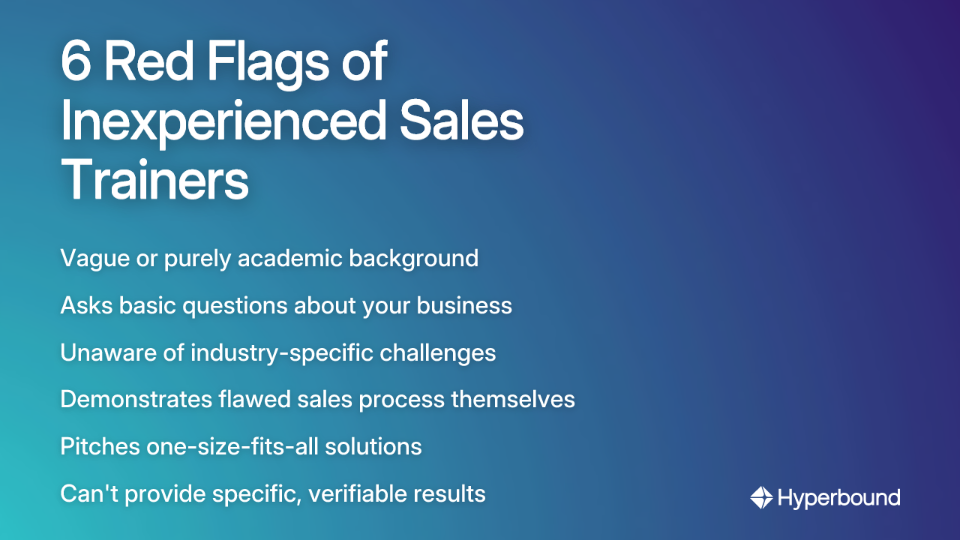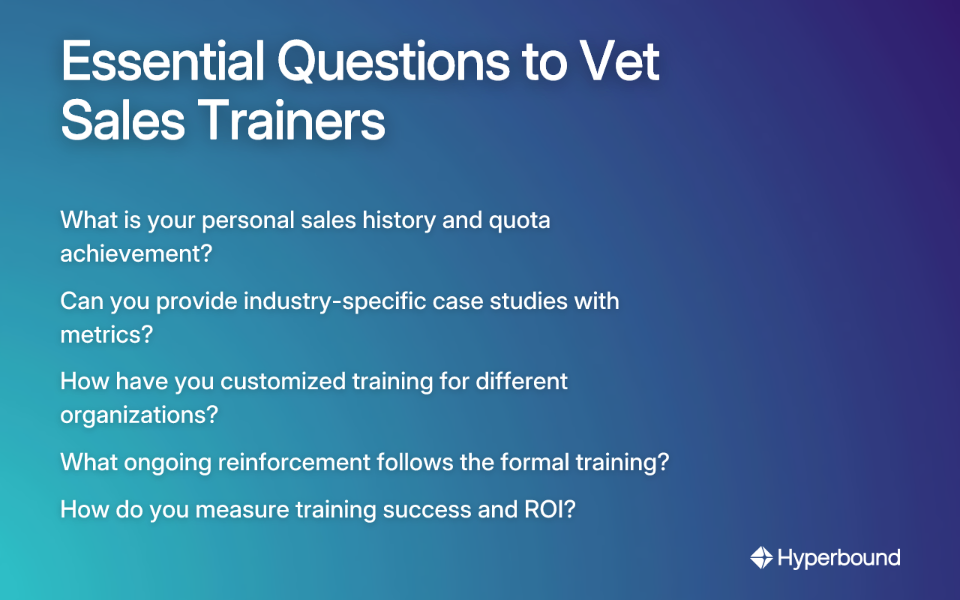
You've just written a hefty check for sales training. Your team sits through a full-day workshop filled with PowerPoint slides and role-playing exercises. Everyone nods along, takes notes, and even feels motivated... for about a week. Then they're back to their old habits, and your metrics haven't budged.
Sound familiar? You're not alone.
"Most of them are shit at being salesmen and that's why they do sales training," one seasoned sales professional bluntly stated in a recent discussion. Another lamented, "I took Sandler at my previous job and didn't learn much new to be honest."
The uncomfortable truth is that the sales training industry has a serious credibility problem. Many so-called "experts" have never carried a quota, managed a pipeline, or sweated through the end of a tough quarter. They've never experienced the real pressure that your SDRs (Sales Development Representatives) and AEs (Account Executives) face daily.
As one sales leader put it, "Sales is a learn on the job profession. It has a low barrier to entry but the ramp up career wise can be hard, elitist and exhausting." This makes your choice of guide or trainer critically important.
This article will equip you with the tools to distinguish between authentic sales practitioners and theoretical presenters. We'll provide a checklist of red flags, a set of vetting questions, and the criteria for selecting a training program that delivers real ROI instead of empty promises.

The Red Flags of an Inexperienced "Guru"
Before you invest in any sales training program, watch for these warning signs that signal a lack of real-world experience:
1. They Have a Vague or Purely Academic Background
Many trainers have never held a quota-carrying role. They've only ever taught sales or worked in adjacent fields.
What to watch for: Their LinkedIn profile shows roles like "Consultant," "Trainer," or "Speaker" but no time as an SDR or AE. They may have impressive credentials from business schools but lack the battle scars of actual selling.
Even when evaluating trainers from established programs, it's crucial to dig into the specific trainer's background, not just the brand name.
2. They Ask Basic Questions About Your Business
A credible trainer with business acumen should do their homework before your first call.
What to watch for: If they ask, "So, what does your company do?" or other fundamental questions in your initial conversation, it shows they haven't prepared. According to The Sales Blog, a knowledgeable trainer should understand your industry and specific challenges before you even speak.
3. They Are Unaware of Your Industry's Common Problems
A true practitioner has pattern recognition from years in the trenches.
What to watch for: They speak in generic platitudes about "building relationships" or "adding value" without connecting it to the specific challenges of your pipeline or market. They can't articulate how their methodology would apply to your particular sales motion.
4. Their Own Sales Process is Flawed
How they sell to you is a preview of what they'll teach your team. This is perhaps the most telling indicator of all.
What to watch for:
- Inconsistent Follow-Up: If they can't reliably follow up with you as a prospect, how can they teach your team to do so?
- Failure to Honor Commitments: Missing scheduled meetings reflects a lack of professionalism.
- Lack of Price Transparency: As one sales professional pointed out, "They don't disclose the price until the end of the process... I'd steer away from anything like that." A trustworthy trainer should be upfront about the investment required.
5. They Pitch a One-Size-Fits-All "Magic System"
Beware of trainers promoting generic frameworks without adapting to industry specifics.
What to watch for: They push a single methodology (like a "closers camp") as the solution to every problem, rather than focusing on a consultative approach tailored to your business.
One sales professional recalled, "At one of my first sales jobs the owner of the company put the entire sales staff through something called 'closers camp' for in-home sales. It was absolute inane garbage lol."
6. They Can't Provide Specific, Verifiable References or Case Studies
Every reputable trainer should be able to prove their impact.
What to watch for: When asked for references, they deflect or provide vague testimonials. A real pro will have clients willing to speak about measurable results specific to their industry or sales motion.
The Vetting Toolkit: Questions That Expose the Pretenders
Arm yourself with these direct questions when evaluating potential training providers:

On Personal Sales Experience:
- "What is your personal sales history? Can you walk me through a complex deal you personally closed and the challenges you faced?"
- "What was your quota, and how consistently did you achieve it in your last sales role?"
- "Have you personally implemented the MEDDIC methodology in a real sales environment? What were the results?"
On Proven Results & Methodology:
- "Can you provide a case study from a company in our industry? What specific metrics improved after your training (e.g., conversion rates, deal size, sales cycle length)?"
- "How have you customized your training for different organizations? What adjustments would you make for our specific sales challenges?"
- "What specific enablement resources will our team have access to after the formal training ends?"
On Application & Reinforcement:
- "Sales acumen is built over time, not in a one-day seminar. How does your program ensure ongoing reinforcement and coaching to develop new habits?" (This directly addresses the common sentiment: "You can't teach a kid to ride a bike at a seminar.")
- "How do you customize your content for different roles, like SDRs versus AEs?"
On Their Own Business Practices:
- "What is the full cost of the program, including any materials and follow-up sessions?"
- "How do you measure the success of your training? What metrics should we expect to improve, and by how much?"
What Good Looks Like: Identifying a True Sales Practitioner
Now that we've covered the warning signs, let's focus on the positive criteria that indicate you've found a high-quality, practitioner-led training program:
1. A Verifiable Track Record of Real-World Sales Success
Look for trainers who have been top performers in relevant industries. Their LinkedIn should detail sales achievements, not just training roles.
Example: A trainer who was a President's Club winner at a SaaS company is more credible for training a Salesforce rep team than someone who has only ever been a trainer. When evaluating programs based on specific sales methodologies, verify that the trainer has actually implemented those approaches successfully in a real-world sales role.
2. A Focus on Modern, Consultative Approaches
Effective training moves beyond transactional tactics. It focuses on developing business acumen and a consultative mindset.
As The Sales Blog explains, credibility allows salespeople to build trust by demonstrating acumen and experience.
The curriculum should cover essential consultative skills:
- Prospecting and outbound messaging techniques
- Discovery and qualification (using frameworks like MEDDIC)
- Value-based storytelling and objection handling
- Negotiation and closing skills
3. Detailed, Specific, and Relevant Testimonials
Don't just look for quotes; look for stories that demonstrate real impact.
What to look for: Testimonials that cite specific improvements, like "Our team's lead conversion rate increased by 20% within a quarter," or "We shortened our average sales cycle by 15 days."
4. A Blended and Continuous Learning Model
Great training isn't a one-time event. It's a process that builds skills over time.
Look for programs that offer:
- Bite-Sized Modules (Micro-learning): For better retention and application.
- Reinforcement Through Coaching: Regular follow-up is critical for skill development.
- Practical Application: Use of tools like Hyperbound's AI Sales Roleplays for unlimited, real-world simulations.
- Customization by Role: Different approaches for SDRs versus AEs.
5. Industry-Specific Adaptations
Effective sales training isn't generic. It should be tailored to your industry's specific buying process.
A quality trainer will discuss how their methodology applies differently to various contexts. For example, how MEDDIC qualification questions might differ between SaaS and manufacturing salespeople, or how enablement resources should be customized for your specific sales motion.

Invest in Practitioners, Not Presenters
The sales training industry is flooded with people who can talk a good game but have never actually played it. To avoid wasting money, you must scrutinize backgrounds, ask tough questions, and demand proof of results.
While "Sales people hate sales training," as one professional noted, the right program led by a seasoned practitioner can transform a team's performance. Sales training isn't inherently worthless—but training from someone who has never carried a quota often is.
Use this guide to find a trainer who has actually sold, who understands your world, and who can provide the practical skills your team needs to win. Look for practitioners who have implemented proven methodologies like MEDDIC or customer-centric selling in real sales environments.
Remember the wisdom from the trenches: "Sales is a learn on the job profession." The best trainers aren't just teaching—they're sharing battle-tested strategies they've personally used to succeed in the very same trenches your team is fighting in every day.
Frequently Asked Questions
Why is most sales training ineffective?
Most sales training is ineffective because it is delivered by "presenters" who lack real-world, quota-carrying sales experience. This results in theoretical, generic advice that doesn't apply to the daily challenges your sales team faces, leading to a temporary motivational boost with no long-term improvement in metrics.
What is the biggest red flag of an inexperienced sales trainer?
The single biggest red flag is a lack of a verifiable track record in a quota-carrying sales role. If a trainer's resume is filled with "consultant" or "speaker" titles but shows no history as an SDR or Account Executive who consistently met or exceeded targets, they likely lack the practical experience to teach effectively.
How can I tell if a sales trainer has real-world experience?
You can verify a trainer's real-world experience by scrutinizing their sales history and asking direct questions about it. Ask them to walk you through a complex deal they personally closed, discuss their quota attainment, and provide specific, metric-driven case studies from companies similar to yours. A true practitioner will have battle-tested stories and verifiable results.
What are the most important questions to ask a potential sales trainer?
Beyond their personal sales history, you should ask how they customize training for different roles (SDR vs. AE), what ongoing reinforcement and coaching they provide after the main session, and how they measure the ROI of their training. A good trainer will have clear, confident answers about customization, long-term habit building, and the specific business metrics they expect to improve.
What makes a sales training program successful?
A successful sales training program is one led by an experienced practitioner that focuses on continuous, customized learning rather than a one-time event. It should include a blended model of micro-learning, regular coaching for reinforcement, and practical application exercises (like AI role-playing) that are tailored to your industry and specific sales motion.
How can I ensure sales training has a lasting impact?
To ensure a lasting impact, choose a program that includes ongoing reinforcement and coaching. One-day seminars rarely change long-term behavior. Look for training that incorporates follow-up sessions, access to materials, and tools for continuous practice to help salespeople build and maintain new habits over time.
Is sales training worth the investment?
Sales training is worth the investment only when you partner with a seasoned practitioner who can deliver tangible results. While generic training is often a waste of money, a program led by someone with a proven sales track record can provide your team with the specific skills and strategies needed to improve performance, shorten sales cycles, and increase revenue.

Your bottom line deserves nothing less.
Book a demo with Hyperbound
.png)













